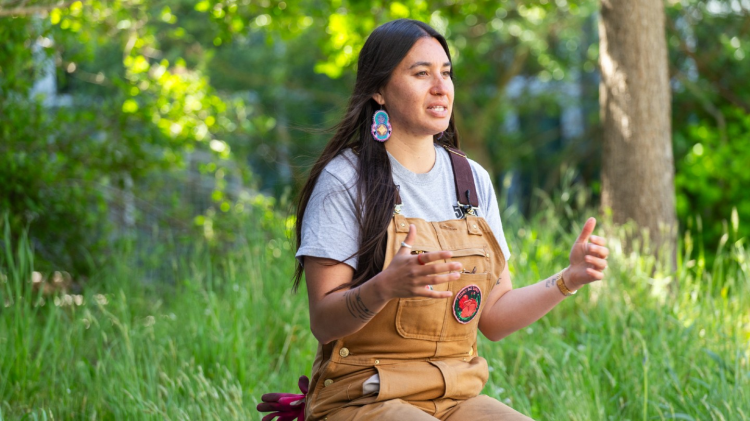Tiny shoots spring up in the courtyard now called A Place of Medicine, home to some of most vital Indigenous ecosystems on the University of Victoria campus, including multiple camas meadows, marshes and wetlands, as well as shady creeks and other Indigenous food and medicine bearing systems.
This space is where Loreisa Lepine, UVic's inaugural Indigenous Land Steward, shares her knowledge and love of native plants to heal people and the lands themselves

Loreisa Lepine is UVic's inaugural Indigenous Land Steward. Photo Credit: UVic Photo Services
"My role, the title, is my birthright. These are the lands of my ancestors, I want to protect my home."
Loreisa Lepine, Indigenous Land Steward
"I consider myself a knowledge holder in training," says Lepine. "In my culture, we are knowledge holders (not experts) because we hold something until it is passed on."
In partnership with Drew Elves (Eco-Cultural Steward), she works alongside students and Indigenous faculty to ensure that ecological restoration is place-based and that ecosystem processes are restored in support of Indigenous-led resurgence. Her work started as part of the Campus of Living Lands project, but has expanded and grown on its own, and now includes three restoration sites on campus - A Place of Medicine, the marsh in front of the First Peoples House, and the forest behind the new Indigenous Law Center.
"A Place of Medicine is our largest and most consistent accomplishment; in my colleague Drew's initial restoration planning for the space, 42 Indigenous plant species were found. We have now tripled the amount of Indigenous food and medicine plants to 160," says Lepine.
As an Indigenous Land Steward, Lepine introduces Indigenous faculty and their students to the native plant gardens on campus, such as A Place of Medicine in the David Turpin courtyard. A primary focus of Lepine's work is hosting classes and supporting Indigenous professors with land-based learning in their curriculum. The classes range from university level to schools from the Greater Victoria School District.
"We work with different ages and abilities, sometimes the students have never planted anything in their life," says Lepine.
Originally planted as a native garden by the School of Environmental Studies and university maintenance staff, A Place of Medicine was suffering from invasive species, harsh conditions from the surrounding built-up areas and a lack of focused care. Greater plant diversity and healthier eco-systems, though, have seen a return of pollinators and other animal activity.
UVic restoration ecologist Nancy Shackelford met Lepine at a community event and she knew instantly that Lepine has an important voice the campus community needs to hear, leading pivotal work for the campus to witness.
"The School of Environmental Studies is lucky to have the opportunity to champion Lepine's expertise and passion for working on her rightful territory," says Shackelford.
Part of what informs Loreisa's work stems from her own concerns around the approaches taken to our mental health crisis. Students have opened up and connected with the land, which confirms for Loreisa that this work is medicine and healing. Too often, she sees the stress and fear that prevents the students from having relationship with our more-than-human kin.
Camas is now just one of 160 food and medicine plants now found thanks to restoration efforts. Photo Credit: UVic Photo Services
"We begin and end each class in circle; we ask the students at the beginning and at the end how they are feeling every time they feel better and happier at the end of the class."
Loreisa Lepine, Indigenous Land Steward
Immersing one's hands in soil releases serotonin and being fully present is positive for our mental health. Lepine adds that the impact of her work is giving students permission to experience wonder and awe.
"Our semester is fully booked," says Lepine. "I love talking to the students and sharing my ancestors' knowledge."
For Lepine, growing up amongst Songhees Nation Elders instilled in her the importance of curiosity and asking questions. The stories and teachings were passed down, but it was her mother who showed her how to be an advocate and taught her the importance of knowing how to be treated. Lepine says her eldest brother effortlessly modeled the importance of gentleness and kindness towards human and more-than-human relatives.
As UVic's Indigenous Land Steward, Lepine carries her ancestors in her heart and shares those teachings with Indigenous faculty and students. Her goal is to care for the five endangered ecosystems on campus and re-establish the ever-growing list of threatened native plant species. For example, native bunch grasses are essential for withstanding droughts and their intricate root systems help sustain the vitality of these Indigenous pollinator meadows through the dry season.
Hundreds of plants, birds and insects are responding to Lepine's careful attention. Her position, however, is annually funded so there is still work to be done to make it a more permanent role something Shackelford and the Campus as Living Lands co-lead, Dr. Jeff Corntassel, a citizen of the Cherokee Nation and Professor of Indigenous Studies, are advocating for.
"I have seen the stellar jays come back, dragonflies, bees sleeping in flowers, and more butterflies. A lot of change can happen with more care."
Loreisa Lepine, Indigenous Land Steward










